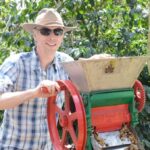
The Future of Coffee Farming in Antioquia, Colombia
As the average age of coffee farmers continues to rise, the department of Antioquia, Colombia searches for new strategies for the future.

Last month I had the good fortune to visit the Third New Generation Coffee Camp in Antioquia, Colombia. The camp draws a thousand young people from the regions coffee farms and gives them three days of education on coffee farming, marketing, brewing, roasting, and more. It is free for the young farmers (between the ages of 20 and 30) to attend the camp.

A couple of the key goals for the camp are one, to give young people in a region that has been rocked by violence an alternative path to follow, and two, to encourage young people to stay on the farm and work towards building a sustainable future for themselves and their communities. You can read a Field Report about my trip in the upcoming August + September issue of Barista Magazine.

Before camp began, however, I also had a chance to visit a couple of small farms outside the small town of Giraldo in Antioquia. They were both beautiful, and they have been producing terrific coffees. One, owned by Silvia Helena Higuita, had just won the Third Antioquia’s Best Cup, a coffee competition created in conduction with the New Generation Coffee Camp to promote specialty coffee in Antioquia. While Antioquia has long been one of Colombia’s top coffee-producting departments, in the past it has been known primarily for its quantity not quality. The programs are built to change that and create a market for specialty coffee and the tools for farmers to be able to produce it.

And here’s how the two parts of my trip intersect, the average age of a coffee farmer in Colombia is 55. In Antioquia, the average age is 57! At both farms I visited, the farmers are representative of that rising average age, but both families also were sending younger members to the camp.

Coffee farming is demanding, tiring, hard work, and the thought of 57 year-olds doing it is staggering. The fact that that age is only the average, however, means that people even older than 57 are still toiling in the fields. But unless a new generation comes along to replace their labor, not only will the rural communities lose out on coffee-related income, which in many places represents around a third of all economic activity, they also lose out on coffee. In fact, unless young people start farming and build a sustainable future for themselves and their communities, we will all lose out.


